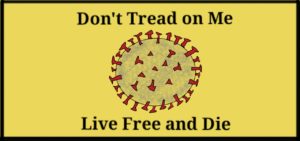by Daniel W. Tigard, Ph.D.
In recent days, an increasing number of individuals have disobeyed policies restricting mass gatherings to rally in support of government officials reopening the state and the country. Such protests have been fueled by conspiracy theorists like Alex Jones and other public figures who claim that the lockdowns, which are intended to decrease the spread of COVID-19, are schemes aimed at disrupting the economy and undermining Trump’s presidency. Notably, Trump too has voiced support for easing the lockdown restrictions, particularly in states led by Democratic governors. And just like that, as some have observed, efforts at increasing solidarity in troubling times can wither into yet another radically bipartisan political quibble.
So, how should healthcare leaders and local government officials respond to the lockdown protests? In a recent statement, Governor Mike DeWine of Ohio framed the controversy over easing the restrictions as a dilemma, namely between protecting people from the virus and protecting people from a “broken economy [which] can also be lethal.” In doing so, his remarks, like Trump’s ‘Liberate’ tweets and earlier efforts to ease social distancing, risk presenting a false choice. In short, opening too soon will still cost lives, which will negatively impact the economy, perhaps just as much as prioritizing public health by keeping economic activity closed. At any rate, it seems that the debate is not simply a matter of saving lives versus saving the economy; continued losses of both kinds can be expected. And as IMF officials have stated, a worldwide economic depression is upon us. In the U.S., for instance, unemployment claims have now reached 26 million in the past five weeks.

Given the urgency of the threat to public health along with the inevitability of economic losses, the question seems to be: How can we best support the health of the general population and the safety of healthcare workers who are dying in an effort to help us? According to an April 8th poll by Quinnipiac University, “81 percent of voters say they would support a stay at home order on a national level.” With this figure in mind, it appears that those who shout “You have to disobey” are the minority. Still, if the debate over the lockdowns is a matter of public health as well as health and safety for healthcare workers, it is unsurprising that those on the healthcare frontlines view the protests as “a slap in the face.” As seen in recent images from a Denver rally, healthcare workers have counter-protested by standing on the streets in full scrubs to block the rallies of those who disobey stay-at-home orders. Responses of those who cunningly demand “give me liberty or COVID-19” include nothing short of adding insults to the injuries already sustained by healthcare workers.
Beyond taking their message literally to the streets, what more can healthcare professionals do to convince us to do our part in flattening the curve? Their public pleas to stay at home, some made over a month ago, are now being disregarded. Perhaps those who have nearly lost their lives can help to send a message to the protesters – as one recovered patient recently shared – about how such actions are not just a threat to their own health but also dangerous for others. In fact, according to one source, anti-lockdown protesters have died from the coronavirus. And while we may well grant the right to risk harm to oneself, following J.S. Mill’s celebrated principle, the problem – and the legitimate use of paternalistic policies – is when one’s actions risk harm to others. Would those who care more for their economic welfare than health truly demand absolute liberty at the cost of others dying? According to some protesters, “yes, even potentially the health of others” is an “acceptable risk.”
Considering the grave concern for rationing vital medical resources, such as the ventilators needed to help COVID-19 patients, healthcare professionals are increasingly confronted with the tragic ethical question of whom to prioritize when supplies become scarce. If they are anything like the respondents in MIT’s ‘Moral Machine’ survey – a questionnaire about who should be saved (or sacrificed) by self-driving cars – they may prefer to prioritize everyone (even dogs!) over those who break the law. Of course, here we see why some rationing schemes, such as that of the United Network for Organ Sharing, suggest excluding one’s status as a law-abiding citizen from considerations of medical rationing. Decisions of life or death are for judiciary bodies, not common citizens, so the reasoning goes. However, as displayed by the protests, such decisions are knowingly being taken into the hands of those who breach stay-at-home orders.
To be sure, standing up for liberty is often something to be celebrated. Still, those who gather carelessly in masses at times like these, if they’re given COVID-19 before they’re given absolute liberty, should hope that the frontline workers responsible for their care are unlike the average respondents of the Moral Machine experiment.